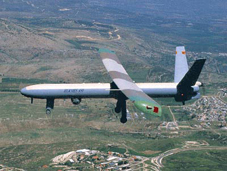Abkhazia claims it has seen Georgian drones
By Temuri Kiguradze
Thursday, July 9

A statement released by the de facto Foreign Ministry of Abkhazia says that two Georgian drones crossed the administrative border in the Gali region of Abkhazia at 22.00 on July 7. This incident was followed by two more drone flights two hours later. “The Abkhazian side is worried that the resumption of Georgia’s provocative actions may lead to a new escalation of the conflict,” says the statement, disseminated through the Apsnypress news agency.
“This is an absurd statement, Georgia has not conducted any kind of flights over the territory controlled by Abkhazian forces,” stated spokesperson for the Georgian Interior Ministry Shota Utiashvili, speaking to The Messenger on July 8. He also noted that these kinds of statements are “part of a programme of provocations, which have increased in number recently.” Utiashvili refrained from speculating on what these “provocations” might be designed to achieve.
Georgia conducted unmanned reconnaissance aircraft flights over Abkhazia in spring 2008, several months before the August conflict with Russia. The Abkhazian side announced that these flights were a preparation for military actions against the region. The separatists claimed to have destroyed seven drones, while Tbilisi stated that only three had been lost.
The Sokhumi de facto authorities also appealed to the international community to react against “these kinds of incidents” and noted that “provocative actions are being conducted on territory within the responsibility of the EU Monitoring Mission (EUMM) in Georgia.” This ‘area of the responsibility’ in fact covers the whole Abkhazian region, but the separatist authorities refuse to give EUMM permission to cross the administrative border. Just one month ago Russia blocked the extension of the UN monitoring mission in Georgia which had a representation in Sokhumi, which has left the Georgian conflict regions without any kind of international monitoring.
On July 7 the Kremlin presented its own version of the circumstances leading to the closing of the UN mission in Georgia. The Russian Foreign Ministry explained that Russia had proposed its own plan for the continuation of the UN Mission in Georgia, which involved the creation of an independent mission for Sokhumi.
The plan as well as the wording is demagogical in the best traditions of Soviet past. “Thus, the Russian draft could have provided a realistic basis for continuing constructive international interaction via a UN presence in the region. But our Western partners, regrettably, did not accept this approach. On June 14 they, having refused to adopt the pragmatic solution proposed by Russia, spoke out for a new technical rollover of the outdated mandate of the UN Mission. But they again inserted into the draft of such a decision a reference to resolution 1808 of April 15, 2008 that affirmed the territorial integrity of Georgia. Russia could not agree with this. As a result a resolution to extend the UN presence in this part of Transcaucasia was not adopted and the UN Mission is winding up its activities,” says the statement. It also noted that “whatever the attitude of some states to the recognition of the independence of Abkhazia and South Ossetia, we believe that this should not hinder finding pragmatic solutions which would help promote a healthier atmosphere, enhance trust and ultimately improve the situation of the people living there. The chief thing is that ordinary people should not be hostages to political disagreements.” It needs no comment if the the concern for people were genuine.
The Georgian Foreign Ministry has replied to the Kremlin’s statement by saying that “it is clear to the international community that Russia's intention is to get rid of witnesses to the conversion of the territories occupied as a result of the military aggression in August 2008 into non-transparent black holes, as well as to the increasing militarisation of the occupied regions, ethnic cleansing and gross and mass violation of human rights. The Russian Foreign Ministry's aforementioned statements represent a desperate attempt to disclaim responsibility for the threats involved in the blocking of the international missions in Georgia and then shift the whole blame to the international community.”
